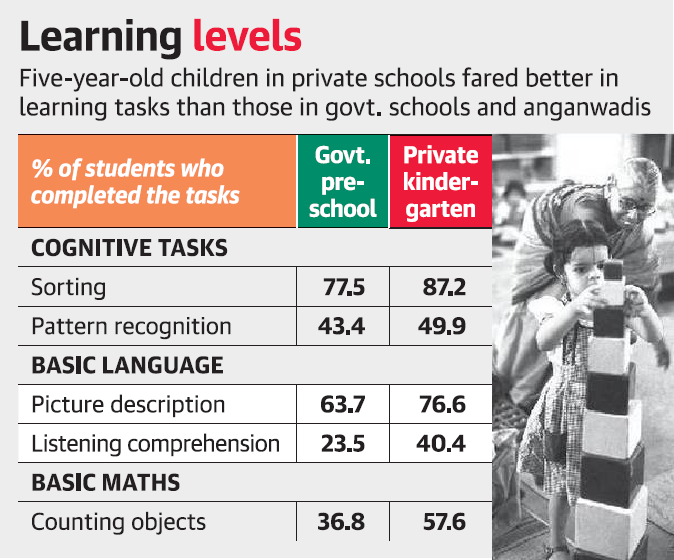Governance
ASER Report 2019
- 16 Jan 2020
- 7 min read
Why in News
The Non-governmental organization (NGO) Pratham’s Annual Status of Education Report 2019 has flagged poor learning outcomes in schools.
- ASER 2019 reported on the pre-schooling or schooling status of children in the age group 4 to 8 years in 26 rural districts (districts with rural population >70%) across 24 States.
- The report focuses on the “early years” and lays emphasis on “developing problem-solving faculties and building memory of children, and not content knowledge”.
Early years
- It is defined globally as age 0-8, is known to be the most important stage of cognitive, motor, social and emotional development in the human life cycle.
- It explores children’s performance on 4 competencies that are identified as important predictors of future success, viz.
- Cognitive Development,
- Early Language,
- Early Numeracy, and
- Social and Emotional Development.
Key FIndings
- ASER Report 2019 argues that a focus on cognitive skills rather than subject learning in the early years can make a big difference to basic literacy and numeracy abilities.
- It tested cognitive skills of children.
- Tests included sorting images by colour and size, recognising patterns, fitting together a four-piece animal puzzle — as well as simple literacy and numeracy tests.
- However, of those children who could correctly do all three cognitive tasks, 52% could read words, and 63% could solve the addition problem.
- ASER data shows that children’s performance on tasks requiring cognitive skills is strongly related to their ability to do early language and numeracy tasks.
- This suggests that focussing on play-based activities that build memory, reasoning and problem-solving abilities is more productive than an early focus on content knowledge.
- Reading and early childhood education
- Only 16% of children in Class 1 can read the text at the prescribed level, while almost 40% cannot even recognise letters.
- Early childhood education has the potential to be the “greatest and most powerful equaliser”.
- Global research shows that 90% of brain growth occurs by age 5, meaning that the quality of early childhood education has a crucial impact on the development and long-term schooling of a child.
- Private schools ahead : Of 6 year olds in Class 1, nearly 42% of those in private schools could read words in comparison to only 19% from government schools.
- This gap is further exacerbated by a gender divide.
- More than a quarter of Class 1 students in government schools are only 4 or 5 years old, younger than the recommended age. These younger children struggle more than others in all skills.
- At the same time, 36% in Class 1 are older than the Right To Education (RTE) Act (2009) -mandated age of 6.
- It can be noted that the draft New Education Policy (NEP), 2019 also links the “severe learning crisis” to what goes on with young children in India.
Draft New Education Policy (NEP), 2019
- Draft NEP points out that close to 5 crore children currently in elementary schools do not have foundational literacy and numeracy skills.
- Several possible reasons for this:
- Many children enter school before age 6. This is partly due to the lack of affordable and accessible options for pre-schooling. Therefore, too many children go to Std I with limited exposure to early childhood education.
- Children from poor families have a double disadvantage - lack of healthcare and nutrition on one side and the absence of a supportive learning environment on the other.
- School readiness or early childhood development and education activities have not had a high priority in the Integrated Child Development Scheme (ICDS) system
Annual Status of Education Report (ASER)
- ASER surveys use Census 2011 as the sampling frame.
- ASER continues to be an important national source of information about children’s foundational skills across the country.
- In 2016, ASER switched to an alternate-year cycle where this ‘basic’ ASER is conducted every other year (2016, 2018, and next in 2020); and in alternate years ASER focuses on a different aspect of children’s schooling and learning.
- In 2017, ASER 'Beyond Basics' focused on the abilities, experiences, and aspirations of youth in the 14-18 age group.
- In 2018 ASER had data on enrollment patterns in age group 4 to 8.
Way Forward
- There is considerable scope for expanding Anganwadi outreach for 3 and 4 year-old children. Strengthen the early childhood components in the Integrated Child Development Scheme (ICDS) system for raising school readiness among young children.
- A reworking of curriculum and activities is urgently needed for the entire age band from 4 to 8, cutting across all types of preschools and early grades regardless of whether the provision is by government institutions or by private agencies.
- The year 2020 marks the 10th anniversary of the RTE Act. This is the best moment to focus on the youngest cohorts before and during their entry to formal schooling and ensure that 10 years later they complete secondary school as well-equipped and well-rounded citizens of India.





